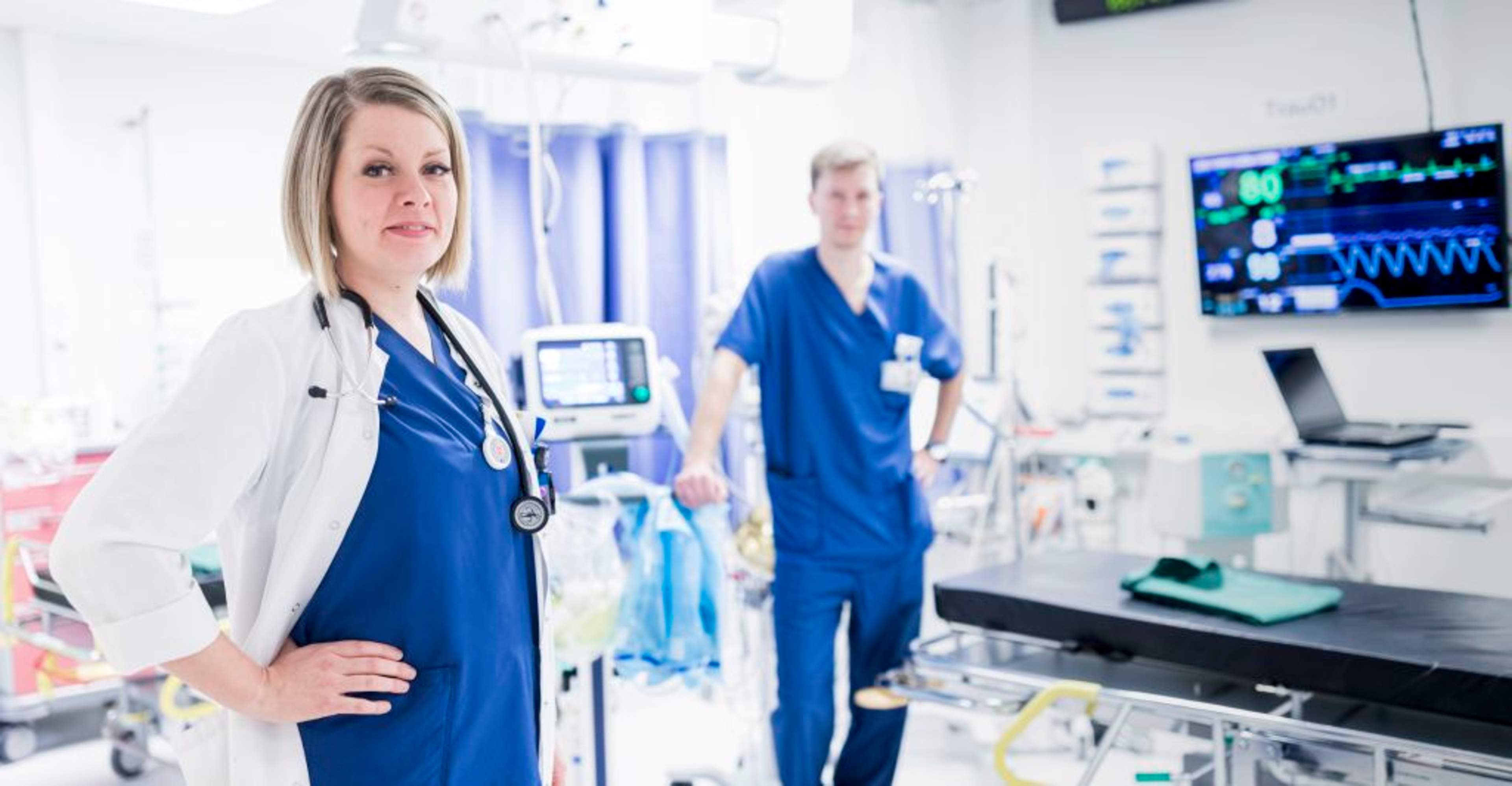The multidisciplinary team that makes up an emergency department is made up of physicians, registered nurses, medical orderlies, practical nurses, and ward secretaries. In the emergency department, other professionals may also participate in the treatment process. Some options include a pharmacist, an instruments attendant, a cleaning attendant, and a patient transportation orderly. Often you will find security guards working the emergency department as well.
Who cares for me in the emergency department?
A multidisciplinary team is at your disposal in the emergency department.

Doctors from several specialties can often be found working in the emergency department. A physician’s most important task is identifying a patient’s illness and deciding on the appropriate treatment. To reach the correct diagnosis, the doctor will interview and observe the patient and commission various tests and examinations. An emergency department physician must be responsible, highly competent, a capable communicator, able to maintain confidentiality, and tolerant of stress. Some of a physician’s working hours, even in the emergency department, will be spent drafting written documents such as patient records and referrals.
A physician is a university graduate with a second-cycle medical doctor degree, in Finland called a Licentiate in Medicine. Medical students in the final stages of their training, Bachelors of Medicine also called interns, may also participate in the treatment of patients.
Physicians with a completed degree are issued an official license to practice their profession independently.
Most of the nurses in an emergency ward will be registered nurses. Depending on the department, some public health nurses, obstetrical nurses (midwives), surgical and anaesthetic nurses, psychiatric nurses, paramedics, or intensive care nurses may also be present.
A registered nurse’s duties in an emergency department include assessing the need for care, conducting treatment and dispensing medication, as well as teaching and guidance duties.
Some such nurses may act as responsible shift nurses, responsible for the running of the emergency department during evening and night hours and providing expert nursing guidance to colleagues.
Nurses are health care professionals with a first-cycle degree from a University of Applied Sciences. Some registered nurses may hold a second-cycle college degree as well.
Nurses are, like physicians, registered medical professionals with an official license.
Practical nurses and medical orderlies may work within emergency departments in their own particular specialty, such as applying casts. Some of them may be qualified to dispense medication through workplace training. They participate in emergency medical care alongside registered nurses.
Today, practical nurses hold a vocational qualification in the social services and health care field either through an initial vocational qualification or a competence-based qualification.
Medical orderly and practical nurse are protected professional titles.
Most emergency departments employ ward secretaries alongside medical personnel. The secretaries tend to medical and patient records and command a significant know-how of the relevant legislation and health care service networks. They are responsible for a wide variety of information management tasks from patient intake, answering phones, processing patient records and referrals, to ordering office supplies. For these multi-talented individuals, the daily duties of the job may be very variable depending on the department.
A ward secretary may hold an initial qualification in the social services and health care field or another field, and some may hold a further vocational qualification as a secretary.
The nurse manager and the assistant nurse manager are the immediate supervisors of the nursing personnel of the emergency department. The nurse manager is the administrative head of the department, responsible for ensuring the smooth running of the department and its adequate and competent staffing, thus promoting high-quality, safe care for its patients.
The assistant nurse manager is often responsible for coordinating the day-to-day operations in the department. The nurse manager and assistant nurse manager are jointly responsible for the development of their unit and the well-being of its staff.
The nurse manager and the assistant nurse manager often have an education in administrative affairs in addition to their medical degree. They may have a second-cycle university of applied sciences or a university Master’s degree, or have undergone some shorter course of leadership training.
Some of the largest emergency rooms employ a pharmacist. The pharmacist may, for example, be tasked with ordering in medication and maintaining an adequate supply in the medication rooms and cabinets. In some emergency departments, the pharmacist may also meet with patients to, for example, make sure their home medication regimen is in order.
Pharmacists possess a pharmacist’s first-cycle college degree.
Pharmacists are registered medical professionals with an official license.
A cleaning attendant in emergency departments is primarily in charge of various sanitation duties, and, in some departments, also of distributing and serving meals. The cleaning attendant’s duties include cleaning the premises, ensuring the cleanliness and maintenance of textiles, and maintaining some medical equipment. The actual duties vary by workplace.
A cleaning attendant often has a cleaning attendant’s initial vocational qualification. This is not a health care field qualification.
Some emergency departments employ dedicated patient transportation orderlies to transport patients for tests, studies, and to other wards. The transportation orderly tends to the patient’s needs during transportation and helps them as needed to get to their tests and to or from wards.
No education in the health care field is required of transportation orderlies.
Security guards or stewards can often be found working at emergency departments. Their primary duty is to ensure the safety of personnel, patients, and other people in the premises, and tend to the physical security of the facility. Their work enables medical care to proceed without disruption.
Hospital security guards are usually qualified as security guards or security stewards.
Updated 24.10.2025

